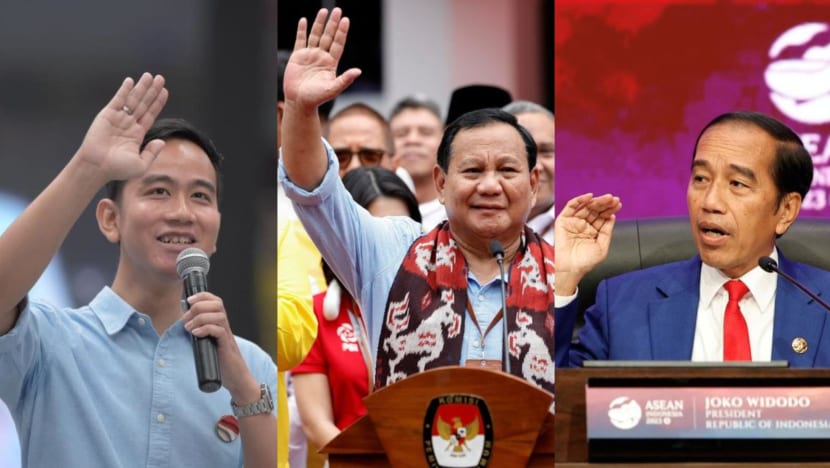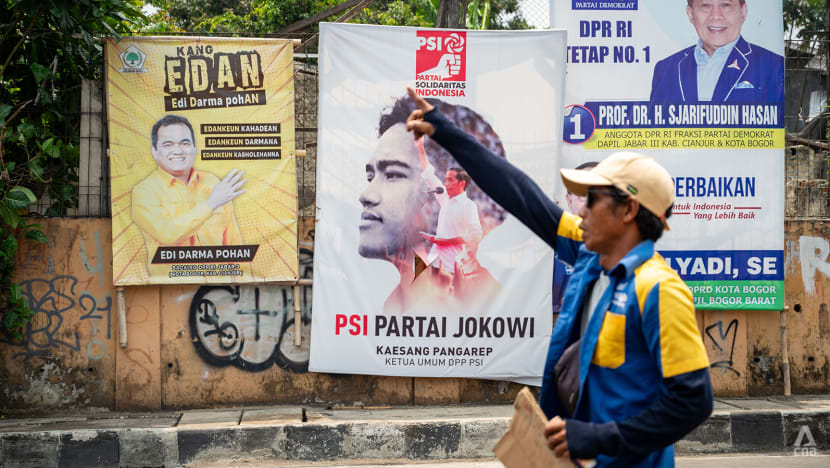Commentary: Picking Jokowi’s son as VP mate is a double-edged sword for Prabowo
Picking President Joko Widodo’s son as running mate might increase Prabowo Subianto’s chances of winning the 2024 Indonesian presidential election, but it could backfire, says ISEAS-Yusof Ishak Institute’s Made Supriatma.

Composite photo: Gibran Rakabuming Raka (left) is the running mate of Prabowo Subianto (centre) in the 2024 presidential election and the eldest son of Indonesian President Joko Widodo's (Photo: CNA/Wisnu Agung Prasetyo, Reuters/Willy Kurniawan)

This audio is generated by an AI tool.
SINGAPORE: Indonesian presidential hopeful Prabowo Subianto’s chances of securing the top job are steadily improving - thanks to his selection of Surakarta mayor Gibran Rakabuming Raka as running mate.
The vice-presidential candidate is the eldest son of outgoing President Joko Widodo, whose popularity Mr Subianto is surely gambling on to win over voters come Feb 14, 2024. But could this also backfire on him?
Mr Jokowi, as the president is popularly called, has enjoyed approval ratings consistently exceeding 80 per cent. Though without his own political party, Mr Widodo leverages a large, dedicated volunteer network that has endorsed Mr Subianto.
With Mr Jokowi’s proxy by his side, Mr Subianto will be looking to secure electoral victories in areas where the president had previously trounced him in 2019: In Central Java (where Mr Jokowi secured an impressive 77.29 per cent of the vote), and in East Java (65.79 per cent), provinces with the third- and the second-largest pool of voters respectively.
Mr Subianto’s own strengths lie in West Java, the province with the largest electorate (where he garnered 59.93 per cent of the vote), and in fifth-largest Banten (61.54 per cent).
ELECTORAL EXPECTATIONS OF JOKOWI’S SON
It’s clear that the 72-year-old retired general expects his 36-year-old running mate to help rally younger voters. Mr Raka’s substantial presence on social media bolsters his appeal, while his background as mayor and entrepreneur paints him as a role model for the youth of Indonesia.
The hope is also for Mr Raka to attract voters from minority communities. Minority voters overwhelmingly supported his father, especially in the wake of 2016 protests against Jakarta’s Christian former governor Basuki Tjahaja Purnama (also known as Ahok) and the blasphemous remarks that led to his removal and imprisonment. Mr Subianto has been associated with hardline religious groups that played a significant role in Mr Purnama’s downfall.
Mr Raka has another ace up his sleeve in younger brother Kaesang Pengarep who leads the youth-oriented Indonesian Solidarity Party (PSI). PSI recently launched an intensive campaign in eastern Indonesia, where minority communities are concentrated.
That said, in the current three-way race, former Jakarta governor Anies Baswedan and running mate Muhaimin Iskandar may not progress beyond the first round of voting, based on their current performance in various polls. The pair draws support from the National Democratic Party (Nasdem), the National Awakening Party (PKB), and Islamist party, the Prosperous Justice Party (PKS).
The hardliners among them will resist aligning with a proxy for Mr Jokowi. But when the alternative is Mr Ganjar Pranowo and the Indonesian Democratic Party of Struggle (PDI-P), pragmatism may lead them to do consider it a better option.
DOUBLE-EDGED SWORD
But the assumption that the Subianto-Raka duo is an unbeatable team might be overly optimistic. Mr Jokowi’s son could be a double-edged sword.
Most notable has been the public perception that Mr Raka's selection embodies dynastic politics, prioritising family interests over the welfare of the people. In a survey conducted by prominent Indonesian media outlet Kompas before Mr Raka’s selection was announced, 53 per cent of respondents disapproved of dynastic politics.
Mr Raka grapples with credibility issues, stemming from his inexperience (having only been elected mayor in 2020) and allegations of nepotism, which the PDI-P has begun leveraging to garner support for its candidate Mr Pranowo.
His inclusion as vice-presidential candidate became possible only after the Constitutional Court's ruling to allow individuals under 40 years of age to run for the position, provided they held an elected office. Notably, Mr Raka’s uncle serves as the chairman of the Constitutional Court. This has provoked disappointment - even anger - among Mr Jokowi's loyal supporters.
Mr Jokowi’s popularity should not be taken for granted, on the assumption that high approval ratings will effortlessly translate into votes. It's important to recognise that these high approval ratings may be driven by the absence of significant opposition and restrictions on the dissemination of information.
Primary competitors Mr Pranowo and Mr Mahfud MD could pose a significant challenge with the backing of the PDI-P, especially in regions like Central Java and East Java.

Mr Jokowi's camp appears to acknowledge this: PSI recently launched an assertive "Jokowi-ism" campaign, prominently featuring the names and faces of Mr Widodo, party chairman Mr Pangarep and occasionally Mr Raka. This underscores their efforts to harness the patriarch's popularity and translate it into electoral support.
A SIDELINED VICE PRESIDENT?
Even if the pair overcome these challenges during the campaign, they will face more in governance. Will the influential PDI-P back Mr Subianto’s coalition in his agenda?
It's also conceivable that Mr Subianto could also sideline Mr Raka as vice president - a position with no significant constitutional powers until delegated by the president - if this was a mere marriage of convenience.
His current alignment with Mr Jokowi could be seen as one: Mr Subianto was appointed defence minister after his 2019 defeat, in a move framed as a means to foster national unity after a divisive election that saw protests against the results turn deadly.
Mr Jokowi could end up with little influence, especially if the PSI, the party led by his youngest son, fails to secure seats in the House of Representatives. PSI currently has no parliamentary representation, having received only 1.89 per cent of the total national vote in 2019, short of the 4 per cent threshold for parliamentary seat allocation.
The rift between Mr Jokowi and PDI-P, the political party that initially propelled him, his son, and his son-in-law to their current positions, might also widen irretrievably.
The choice of Mr Raka as running mate and potential vice president might end up a significant gamble for both Mr Subianto and Mr Jokowi.
Made Supriatma is Visiting Fellow, Indonesia Studies Programme at the ISEAS – Yusof Ishak Institute.

















